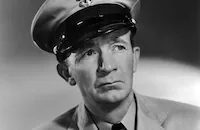Mother Carey's Chickens

Brief Synopsis
Cast & Crew
Rowland V. Lee
Anne Shirley
Ruby Keeler
James Ellison
Fay Bainter
Walter Brennan
Film Details
Technical Specs

Synopsis
Hours before his departure for the Spanish-American War, Captain John Carey, a career naval officer, invites his wife and four children to a picnic near Newport, Rhode Island. While driving in the country, the Careys, who are renting a nearby furnished house, discover an abandoned mansion and stop to investigate it. Enchanted by the once-splendid house, daughter Nancy fantasizes with her sister Kitty about having the money to buy the property. Several months later, during a birthday dinner given in Captain Carey's honor, Mrs. Carey receives word that her husband has been killed. To make ends meet on her husband's pension, Mrs. Carey takes work at a factory and is seriously injured on the job. In spite of offers from their rich aunt Bertha, the Carey children vow to find a way to restore their mother's health while staying together as a family. Consequently, when Nancy is out driving with Ralph Thurston, a Latin teacher with whom both she and Kitty are infatuated, she comes up with a scheme whereby the family will lease the still-empty mansion for a small yearly fee, restore and furnish it using her father's life insurance money, and transform it into a profitable boardinghouse for Ralph and his fellow teachers. With help from the Pophams, the local real estate agents and general store owners, the Careys turn the dilapidated mansion into an inviting residence. Unknown to them, however, Pauline Fuller and her henpecked husband Clarence are plotting with the mansion's Boston landlord, Thomas Hamilton, Sr., to buy the house for themselves. Before the Careys are able to open their doors to the boarders, they are visited by Dr. Tom Hamilton, Jr., who informs them that they must vacate the premises within two weeks. That same day, however, three-year-old Peter Carey falls ill, and Tom volunteers to treat him. After Tom saves Peter's life, he pledges to prevent the Fullers from moving in and, with the help of the Carey children, terrifies the Fullers into leaving by "haunting" the house with manufactured ghosts. Impressed by Tom's kindness, Nancy, who previously had lost Ralph to Kitty, agrees with her siblings that a doctor would be a good addition to the Carey family.

Director
Rowland V. Lee
Cast

Anne Shirley

Ruby Keeler

James Ellison

Fay Bainter

Walter Brennan
Donnie Dunagan

Frank Albertson
Alma Kruger
Jackie Moran

Margaret Hamilton

Virginia Weidler

Ralph Morgan
Phyllis Kennedy
Harvey Clark
Lucille Ward

George Irving
Crew
James Anderson
Pandro S. Berman
John L. Cass
Perry Ferguson
George Hively
J. Roy Hunt
S. K. Lauren
Van Nest Polglase
Gertrude Purcell
Darrell Silvera
Edward Stevenson
Frank Tours
Vernon L. Walker

Film Details
Technical Specs

Articles
Mother Carey's Chickens
By Violet LeVoit

Mother Carey's Chickens
Quotes
Trivia
Originally, RKO slated Katharine Hepburn to star in this picture. She refused to do it, and bought out her contract so that she wouldn't have to.
Notes
In the film, the character "Lally Joy" recites "Norval," a 1762 poem by the Scottish author John Home. According to modern sources, RKO asked Katharine Hepburn to play the part of "Kitty Carey" in this film. Hepburn, who had just been declared a "box office deterrent" by the Independent Theater Owners Association, refused the role and consequently bought out her contract from RKO. RKO executives then brought in Ginger Rogers, who wanted to play a wholesome type, for the role of "Nancy Carey," but replaced her with Anne Shirley before shooting began. In 1963, Disney Productions made a version of Wiggin's story called Summer Magic, starring Hayley Mills and Burl Ives and directed by James Neilson (see AFI Catalog of Feature Films, 1961-70; F6.4771).















